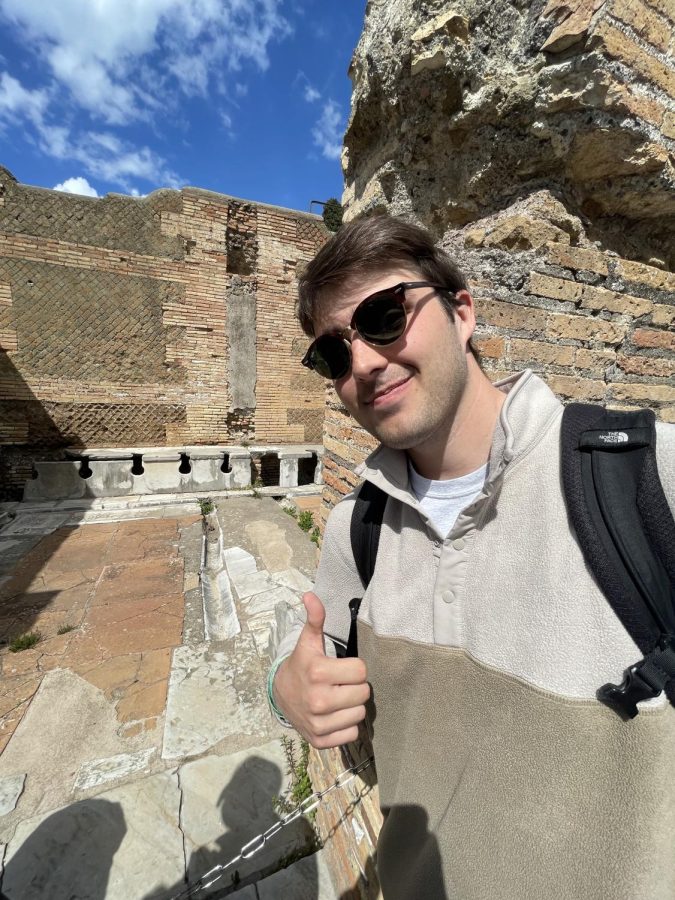Classical Languages: Gray Rucker
Gray Rucker learned advanced Latin grammar through a semester-long campaign in Dungeons & Dragons in LAT 350.
“You roll the dice, and if your character is going to slay Medusa or something, you have to be able to parse out a very complex grammatical construction,” Rucker explained.
From playing Dungeons & Dragons in class to creating a video game inspired by Homer’s epic poetry, Rucker has made learning an old language new and innovative. He shared how — while many people may find the grammar-intensive work boring — he enjoys strengthening his problem-solving skills.
“You really have to look at the sentence holistically and then divide it up and try to figure out the puzzle of the sentence,” Rucker said — in Latin, there is no set sentence order, so any part of speech can be anywhere. “I think that’s a very useful skill in life — to be able to look at the whole, figure out how to divide the problem into smaller pieces and then be able to put it together as one cohesive whole.”
Classics professor Dr. T. H. M. Gellar-Goad — who taught Rucker’s LAT 350 course — said that he could talk “for pages and pages about Gray.”
“Students like Gray don’t come along often,” Gellar-Goad said. “He’s got mad skills in Latin and Greek and a penchant for deep thinking about big issues in the ancient and modern worlds — and, at the same time, he’s one of the kindest people I’ve ever met and one of the easiest for anybody to talk to. I miss him already!”
Rucker’s interest in classical languages began almost 10 years ago when he began taking Latin classes in middle school. When his high school didn’t offer classes to further his study, he worked with a tutor outside the classroom. Rucker explained that — while he has been studying the language for a decade — he has so much left to learn.
“This is going to be my first year without classics,” Rucker said. “I feel like there is so much more left to learn — I don’t know what I am going to do with myself.”
Like many classical languages students, Rucker grew up reading Rick Riordan’s “Percy Jackson and the Olympians” series. The novels and his general interest in mythology led him to pursue Latin in college.
“When I came to Wake [Forest], I took “Introduction to Latin Poetry” (LAT 211) during my first semester and was like, ‘Well, I can’t stop now,’” Rucker said.
Alongside learning practical language skills, Rucker took classes focused on the ancient world. He spent his final semester of college in Rome studying history and literature. The core of his study abroad program was an “ancient city” course, in which he studied the topography of the Roman landscape through lectures and weekly field trips.
“It’s been so cool learning about Roman history and literature but also getting to be exactly where Emperor Augustus stood,” Rucker said.
After he returns to the United States and graduates from Wake Forest, Rucker plans on spending the next two years studying public policy at Duke University. He explained that the problem-solving skills he learned in his Latin classes can apply to his career path.
“It’s about formulating solutions to policy problems,” Rucker said. “The people there are doing such cool work. Most of the people there are going to be a lot older than me with lots of really cool job experiences all across the world solving major, major issues. That’s what I’m very excited about — to work with those people to try to solve problems.”
As he prepares to leave Wake Forest, Rucker encourages freshmen and any student who is interested in Latin or the Classics Department to pursue these courses. He explained that the students’ and professors’ creativity and passion for language enhanced his academic experience.
“The professors are so incredible and innovative and passionate about the subject that it’s infectious,” Rucker said. “I would just say, go for it.”
